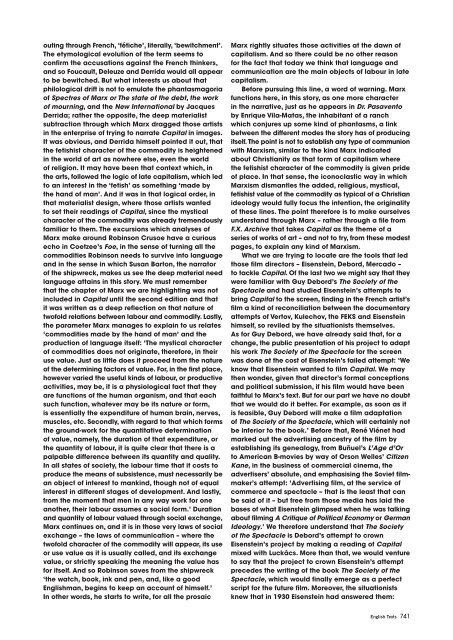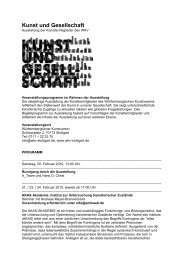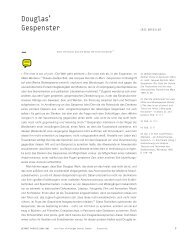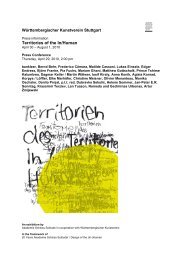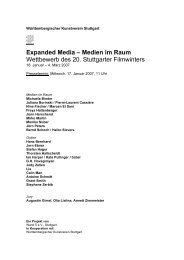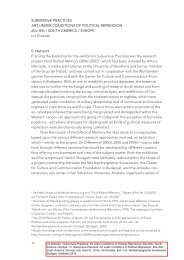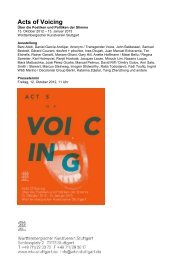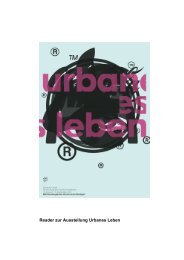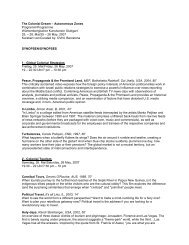English Texts
English Texts
English Texts
Create successful ePaper yourself
Turn your PDF publications into a flip-book with our unique Google optimized e-Paper software.
outing through French, ‘fétiche’, literally, ‘bewitchment’.<br />
The etymological evolution of the term seems to<br />
confirm the accusations against the French thinkers,<br />
and so Foucault, Deleuze and Derrida would all appear<br />
to be bewitched. But what interests us about that<br />
philological drift is not to emulate the phantasmagoria<br />
of Spectres of Marx or The state of the debt, the work<br />
of mourning, and the New International by Jacques<br />
Derrida; rather the opposite, the deep materialist<br />
subtraction through which Marx dragged those artists<br />
in the enterprise of trying to narrate Capital in images.<br />
It was obvious, and Derrida himself pointed it out, that<br />
the fetishist character of the commodity is heightened<br />
in the world of art as nowhere else, even the world<br />
of religion. It may have been that context which, in<br />
the arts, followed the logic of late capitalism, which led<br />
to an interest in the ‘fetish’ as something ‘made by<br />
the hand of man’. And it was in that logical order, in<br />
that materialist design, where those artists wanted<br />
to set their readings of Capital, since the mystical<br />
character of the commodity was already tremendously<br />
familiar to them. The excursions which analyses of<br />
Marx make around Robinson Crusoe have a curious<br />
echo in Coetzee’s Foe, in the sense of turning all the<br />
commodities Robinson needs to survive into language<br />
and in the sense in which Susan Barton, the narrator<br />
of the shipwreck, makes us see the deep material need<br />
language attains in this story. We must remember<br />
that the chapter of Marx we are highlighting was not<br />
included in Capital until the second edition and that<br />
it was written as a deep reflection on that nature of<br />
twofold relations between labour and commodity. Lastly,<br />
the parameter Marx manages to explain to us relates<br />
‘commodities made by the hand of man’ and the<br />
production of language itself: ‘The mystical character<br />
of commodities does not originate, therefore, in their<br />
use value. Just as little does it proceed from the nature<br />
of the determining factors of value. For, in the first place,<br />
however varied the useful kinds of labour, or productive<br />
activities, may be, it is a physiological fact that they<br />
are functions of the human organism, and that each<br />
such function, whatever may be its nature or form,<br />
is essentially the expenditure of human brain, nerves,<br />
muscles, etc. Secondly, with regard to that which forms<br />
the ground-work for the quantitative determination<br />
of value, namely, the duration of that expenditure, or<br />
the quantity of labour, it is quite clear that there is a<br />
palpable difference between its quantity and quality.<br />
In all states of society, the labour time that it costs to<br />
produce the means of subsistence, must necessarily be<br />
an object of interest to mankind, though not of equal<br />
interest in different stages of development. And lastly,<br />
from the moment that men in any way work for one<br />
another, their labour assumes a social form.’ Duration<br />
and quantity of labour valued through social exchange,<br />
Marx continues on, and it is in those very laws of social<br />
exchange – the laws of communication – where the<br />
twofold character of the commodity will appear, its use<br />
or use value as it is usually called, and its exchange<br />
value, or strictly speaking the meaning the value has<br />
for itself. And so Robinson saves from the shipwreck<br />
‘the watch, book, ink and pen, and, like a good<br />
<strong>English</strong>man, begins to keep an account of himself.’<br />
In other words, he starts to write, for all the prosaic<br />
Marx rightly situates those activities at the dawn of<br />
capitalism. And so there could be no other reason<br />
for the fact that today we think that language and<br />
communication are the main objects of labour in late<br />
capitalism.<br />
Before pursuing this line, a word of warning. Marx<br />
functions here, in this story, as one more character<br />
in the narrative, just as he appears in Dr. Pasavento<br />
by Enrique Vila-Matas, the inhabitant of a ranch<br />
which conjures up some kind of phantasms, a link<br />
between the different modes the story has of producing<br />
itself. The point is not to establish any type of communion<br />
with Marxism, similar to the kind Marx indicated<br />
about Christianity as that form of capitalism where<br />
the fetishist character of the commodity is given pride<br />
of place. In that sense, the iconoclastic way in which<br />
Marxism dismantles the added, religious, mystical,<br />
fetishist value of the commodity as typical of a Christian<br />
ideology would fully focus the intention, the originality<br />
of these lines. The point therefore is to make ourselves<br />
understand through Marx – rather through a file from<br />
F.X. Archive that takes Capital as the theme of a<br />
series of works of art – and not to try, from these modest<br />
pages, to explain any kind of Marxism.<br />
What we are trying to locate are the tools that led<br />
those film directors – Eisenstein, Debord, Mercado –<br />
to tackle Capital. Of the last two we might say that they<br />
were familiar with Guy Debord’s The Society of the<br />
Spectacle and had studied Eisenstein’s attempts to<br />
bring Capital to the screen, finding in the French artist’s<br />
film a kind of reconciliation between the documentary<br />
attempts of Vertov, Kulechov, the FEKS and Eisenstein<br />
himself, so reviled by the situationists themselves.<br />
As for Guy Debord, we have already said that, for a<br />
change, the public presentation of his project to adapt<br />
his work The Society of the Spectacle for the screen<br />
was done at the cost of Eisenstein’s failed attempt: ‘We<br />
know that Eisenstein wanted to film Capital. We may<br />
then wonder, given that director’s formal conceptions<br />
and political submission, if his film would have been<br />
faithful to Marx’s text. But for our part we have no doubt<br />
that we would do it better. For example, as soon as it<br />
is feasible, Guy Debord will make a film adaptation<br />
of The Society of the Spectacle, which will certainly not<br />
be inferior to the book.’ Before that, René Viénet had<br />
marked out the advertising ancestry of the film by<br />
establishing its genealogy, from Buñuel’s L’Age d’Or<br />
to American B-movies by way of Orson Welles’ Citizen<br />
Kane, in the business of commercial cinema, the<br />
advertisers’ absolute, and emphasising the Soviet filmmaker’s<br />
attempt: ‘Advertising film, at the service of<br />
commerce and spectacle – that is the least that can<br />
be said of it – but free from those media has laid the<br />
bases of what Eisenstein glimpsed when he was talking<br />
about filming A Critique of Political Economy or German<br />
Ideology.’ We therefore understand that The Society<br />
of the Spectacle is Debord’s attempt to crown<br />
Eisenstein’s project by making a reading of Capital<br />
mixed with Luckács. More than that, we would venture<br />
to say that the project to crown Eisenstein’s attempt<br />
precedes the writing of the book The Society of the<br />
Spectacle, which would finally emerge as a perfect<br />
script for the future film. Moreover, the situationists<br />
knew that in 1930 Eisenstein had answered them:<br />
<strong>English</strong> <strong>Texts</strong> 741


